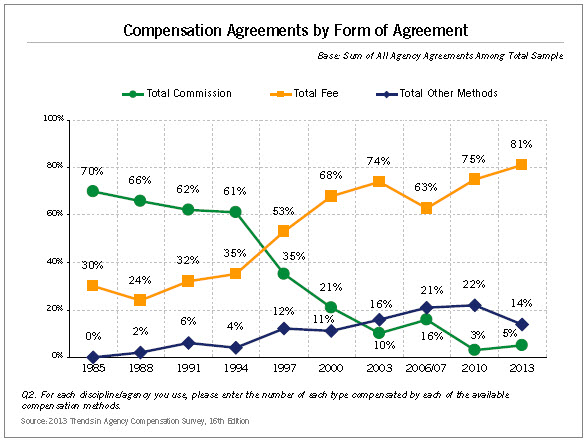We do!!! Value Based Compensation Matters Please excuse the inflammatory headline, above because I...
2013 ANA Trends in Agency Compensation & the Importance of Scope of Work
Fee-Based Compensation Dominates
In a recent survey by the Association of National Advertisers "2013 ANA Trends in Agency Compensation, 16th Edition" one of the key trends is the inexorable rise in compensation agreements to use labor-based or fixed fees as the primary basis for agency compensation.
This year 81% of all client-agency agreements are fee-based, up from 75% in 2010.
This is even more pronounced in larger advertisers (spend > $500 Million) where a full 94% use fee-based compensation as their primary model.
Labor-Based On the Rise
Also of interest is the fact that within the fee component, labor-based fees are increasing in popularity and account for 65% of all fee agreements. Output-based fees (i.e. those that are negotiated for a fixed-fee, either a specific deliverable or project) dropped from 20% to 15%.
This may be to do with the relative simplicity of labor-based fees, and certainly irrespective of the reason, both clients and agencies seem to be favoring this model.
Scope of Work Process
With these results there is little surprise at how important a well managed Scope of Work process is becoming. It is vital for large advertisers that they can accurately define the work needed on an annual basis and have an accurate methodology for budgeting & tracking this important area of spend.
Certainly at Decideware we are seeing a tremendous uptake in our Scope of Work module. Major client companies are spending a good deal of energy on mapping their SOW processes, capturing all the key inputs, benchmarking costs and ensuring that they have all agency spend "under management" (i.e. a rigorous approval process). They are focused on the most effective (and efficient) return on their fee-based budget.
Author: Richard Benyon (Decideware)
Source: 2013 ANA Trends in Agency Compensation, 16th Edition





